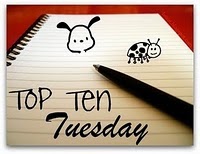Minor personal life digression -- I am eating less and working out, in a desperate and possibly futile attempt to combat my life of fatty, delicious foods (especially during the cold, dark months of winter in Chicago). This has caused my body to become something of a tiredness factory, a phrase that might not make sense if you really think about it, but it does to me.
The above to explain why my Top Ten Tuesday is, in fact, being posted on a Wednesday. Why it's five instead of ten is just pure laziness.

1. Series cliffhangers. If your story’s compelling, I’ll buy your next book. Don’t end it with something like “But – but he can’t be the murderer! Not—“
It's dumb and manipulative. I will stop reading your series immediately.
4. Clouding your meaning in a seemingly impenetrable fog. I’m looking at you, Henry James.
5. It’s not the fault of the author, but when the back of the book gives away 2/3 of the plot. I can’t even look at the backs of books anymore because I’m terrified my will to read it’ll be shot by learning basically everything about it in two seconds.
The above to explain why my Top Ten Tuesday is, in fact, being posted on a Wednesday. Why it's five instead of ten is just pure laziness.

Top Five Bookish Pet Peeves
It's dumb and manipulative. I will stop reading your series immediately.
2. Inaccurate characterizations. When I was a teenager, I read every novel about Elizabeth I that I could find (mainly to see if they had hot Robert Dudley/Elizabeth action). One of them mainly involved her communing with Satan. Just…no.
3. Books written to fulfill an agenda. When this happens, not to get all full of myself, but truth no longer drives the characters. Instead it’s whatever message the author is trying to spread. This is why I stopped reading The Jungle, am not terribly fond of Hard Times (Dickens basically says Utilitarianism is Bad over and over), and haaaaate The Amber Spyglass by Philip Pullman. That wasn’t even written to convey a message; it was written out of anger. I’m not wasting time on someone’s poorly written diatribes.4. Clouding your meaning in a seemingly impenetrable fog. I’m looking at you, Henry James.
5. It’s not the fault of the author, but when the back of the book gives away 2/3 of the plot. I can’t even look at the backs of books anymore because I’m terrified my will to read it’ll be shot by learning basically everything about it in two seconds.
Monday I will be joining you in the de-fattying process. Figuratively.
ReplyDeleteAlso OH MY GOD THANK YOU PHILIP PULLMAN IS THE WORST.
@Julie Dude, I can't even talk about it. That book pissed me off so much. If he had said "*insert religion here* is a very powerful and convincing mistake," people would be furious. But because it's Christianity, it's fine.
ReplyDeleteAnd that wasn't even the worst of it! I seem to remember thinking that because he had left Christ out of his 'Argument Against Christianity,' his argument work. But if you added him in, it totally fell apart. Don't remember details.
Ok, apparently I *can* talk about it. But not without riling myself up. Grrrrr. *shakes fists*
I HAAAATE when the back of the book gives away a huge part of the story. Ooh that irritates me so much! I love that, at least when I review it, I know I can write a better summary for people ;P
ReplyDeleteEven as a committed atheist, I'm afraid I have to confirm that "The Amber Spyglass" is a total failure, for pretty much exactly this reason. The first two books are wonderful, because they are driven by the story, the characters, and the author's imagination—almost everything in "Amber Spyglass," however, is ham-fisted and didactic. Rather ironic, since Pullman so publicly reviled Lewis for the same thing in "The Last Battle," another didactic and ideology-driven novel; in both cases, I'm happy to remove the offending book from my radar, but Pullman's books suffer the more for not having an ending, while Narnia's episodic format never required one.
ReplyDelete